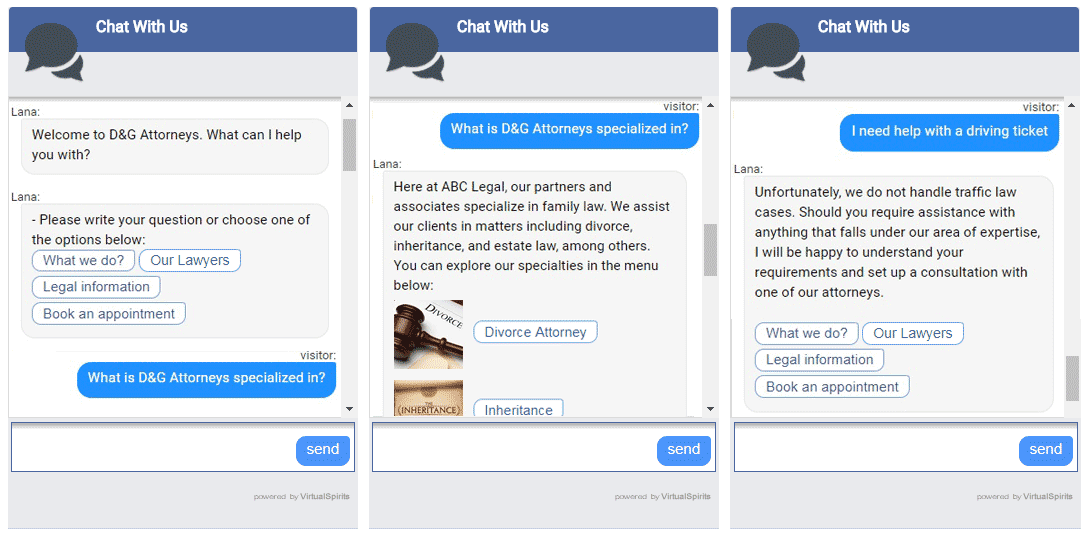
TOPICS:
Chatbot for Businesses Chatbot Optimization
Legal Chatbot – 4 Reasons Why Law Firms Should Add Chatbots to Their Websites
The confusing, complex terminology-ridden field of law, isn’t everyone’s cup of tea. However, attorneys today can no longer rely on their exclusive expertise in matters that the general public has a hard time deciphering. Just like any other modern business, present-day law firms need to take the right steps to ensure that they attract and retain the attention of their target audience. Legal chatbots help them do that. Today, we’ll be going over some important reasons why you, as a law firm, should create a chatbot for your website.

1. Legal chatbots help you establish your niche.
There’s a common problem that any lawyer who’s spent some time in the field has encountered – people call their office and ask for legal services that they don’t provide. For the sake of an illustration, let’s say that you are a divorce lawyer, and someone calls your office asking for help with their driving ticket. Your receptionist politely informs the caller that their issue doesn’t fall under your area of expertise. Over time, handling too many of such calls can make for a considerable waste of time. Legal chatbot development offers a solution.
By building chatbots for their websites, attorneys and law firms are able to assign repetitive admin tasks to their virtual receptionists, a.k.a. their online chatbots. Let’s now imagine that the same person who needed help with their driving ticket, has arrived at your website. Your chatbot greets them with a friendly hello and offers to help.
Chatbot:
“Welcome to ABC Legal. What can I help you with?”Visitor:
“What is ABC Legal specialized in?"Chatbot:
“Here at ABC Legal, our partners and associates specialize in family law. We assist our clients in matters including divorce, inheritance, and estate law, among others. You can explore our specialties in the menu below. "Visitor:
“I need help with a driving ticket.”Chatbot:
“Unfortunately, we do not handle traffic law cases. Should you require assistance with anything that falls under our area of expertise, I will be happy to understand your requirements and set up a consultation with one of our attorneys.”The visitor thus gets a clear – and instant – message about your firm’s offerings, and proceeds to find a different law firm. Essentially, only genuine leads get forwarded to your office, and your calendar only features appointments with clients you would like to work with. Your office staff also has more time to focus on important tasks such as paperwork and legal research.
2. Legal Chatbots can simplify legal information for your visitors.
As a law firm, chances are that your website has pages upon pages of information about legal matters, acts and regulations, prominent cases, and so on. And that is not a bad thing. The legal profession is such that it relies upon this variety of information. But legal vocabulary isn’t second nature to your clients, the way it is to you. Your clients also find lengthy legal documents daunting. Your legal chatbot can make things a bit easier for them, though.
By building legal chatbot for your website, you can ensure that the essence of the content on your blogs and webpages actually reaches your potential clients. Continuing our recent divorce law firm illustration, let’s assume that someone has arrived at your firm’s website and has found several articles on divorce law on your blog. While reading one of the articles, they start coming across terms that they don’t understand. They see a sign at the corner of the page that says, “Chat with us!”
And they decide to do just that.
Visitor:
“What is the meaning of decree nisi?”Chatbot:
“’Decree nisi’, or rule nisi, is a court order that specifies the date on which a marriage will end unless a good reason to not grant a divorce is produced.”Sure, the visitor could just have Googled the term. But it’s easier to have a source of to-the-point legal information right around the corner. Besides, your legal chatbot serves as a one-stop-shop for everything the visitor might need from your website. For example, they can ask something like,
“I’m moving to a new state. Will I have to apply for divorce from there or from my current state?”And the chatbot will pull the information out of your existing content and present it on the chat window.
3. Legal chatbots can make great use of your existing content.
Continuing our discussion from the previous point, building chatbots for legal websites is a great way to leverage the information that already exists on the site. Over the course of their careers, lawyers produce tons of content for their firms, which can serve as highly useful information for their potential clients. The best chatbots for law firms are able to scan this existing content – articles, blog posts, informational videos, news features, and so on – and extract useful snippets that can be delivered to people who arrive on the site in search of legal assistance. The exercise requires minimal effort towards creating content from scratch. This is one of the main reasons why chatbot development has proved to be such a boon for content-dependent professions such as law.
4. You get first-hand information about what your potential clients want.
As a law firm, getting information across to your clients isn’t the only reason why you should create a chatbot. Legal chatbots also relay information to you. The records of your chatbot’s interactions with your website’s visitors contain first-hand information about your potential clients’ requirements and preferences. Later, you can study these records and rework or add to your website’s content, to make it more relevant and engaging for the clients you’re hoping to attract.
For example, if you notice repeated instances of visitors asking,
“Do you have workers’ compensation attorneys?” it could mean that your firm’s offerings are not immediately visible to your potential clients.
You can also analyze chat histories for interesting topics for your next blog post. A question like,
“Can my former employer sue me for damages in [Situation X]?” can give you ideas for a new article that your potential clients would want to read.
Legal chatbot development is well on its way to transforming law practices in the near future. Find out how to create a chatbot for your own website, by getting in touch with us right here.